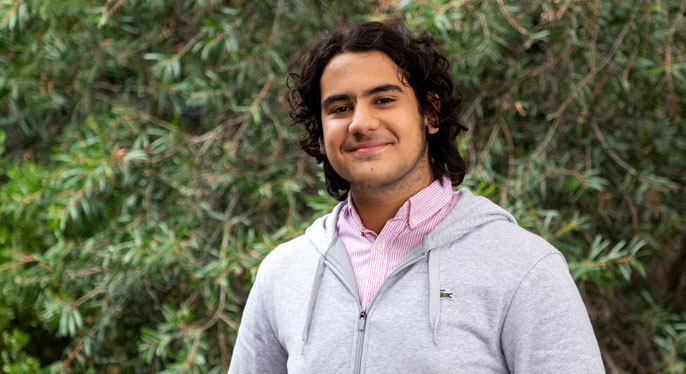Year 12 student, Saad Sabri, arrived at BSSC in mid-2022 from his home in Iraq.
His parents and extended family remain in Iraq. However, an older brother and sister are supporting Saad in Bendigo.
He’s finding his openness to other cultures is also helping him adjust to life in Australia.
“I’ve made some good friends already and can’t believe how much I am being encouraged to express myself at BSSC.
“I think the college is amazing, exquisite, supportive, and such a healthy environment.”
Saad is studying Maths Methods, Spec Maths, Physics, English, and Philosophy and says he would recommend BSSC “definitely and 100%”.
“I am grateful for what I have, but I do reflect on what our family, and Iraq, has lost.”
From the relatively peaceful, regional Australian city of Bendigo, Saad can see a huge difference between the daily lives of those who live here and people trying to cope in Bagdad, where almost everyone has been so badly affected by the tragedy and disruption of the war.
Stories from Iraq dominated news in Australia during the 2003 – 2011 war. Saad offers a personal perspective on the consequences of military conflict for a young person.
“I was lucky because I was only a child and our family was not poor or located in the worst-impacted areas. We even moved to Jordan for a while.”
Saad says before the war, Iraq was a progressive and highly-developed country with a first-class education and health system.
“I have experienced the long-term impacts, and waste of war—which are devastating. The war has set Iraq back 50 years.”
He remembers the power going off for six hours on 42*C days so no-one could run their air conditioners.
“The water gets cut off regularly. Access to health care is horrible and it’s no longer free—you have to pay for it.
“Apply this to everything,” he says. “There are basically no good-quality services and what’s available is not reliable or all that respectful of human needs.”
Saad is also aware a positive community vibe between people has been lost, making it “impossible for people to live their best lives”.
He says people are still polite, but they’re more afraid and distrustful.
“You can feel it when you talk with them.
“Once, if something went wrong in your street, everyone would be there to help out. But recently that’s stopped because if you get involved you could be blamed for whatever happened.
“It’s also devastating to realise you no longer react to news of something like an explosion that just killed 30 people—some things should never be normalised—but that’s what war does to you.”
Saad had initially been scheduled to do a 20-week language course when he arrived in Australia.
However, it was apparent his English was excellent. He coped well with Year 11 semester two subjects, and was able to move straight into 3/4 subjects this year.
Saad is also part of the Student Leadership Team.
He believes education should be about building a toolbox of learning skills.
“It’s much more important to learn how to learn—not just memorise facts,” he says. “BSSC is ideal for me.”
In future, Saad plans to go to uni and possibly study nano-technology.
His hope is to have a career that allows him plenty of time for travel and developing other interests.
He enjoys chess and soccer and used to swim competitively—even making the Iraqi national team when he was twelve.
“I used to be so fit and I’m working hard to get that back.”
Saad is also persevering with violin—which he began teaching himself four years ago using Youtube videos and committing to an hour’s practice each day.
He’s appreciating having a teacher now and is part of Bendigo College’s Chamber Strings orchestra.
Asked what he’s proudest of, Saad says achievements are important—but not a lasting thing.
In contrast, he recognises qualities as long-lasting influences impacting every part of life and much more significant than achievements.
“I have multiple interests but I’m not absolutely top of any field. I think doing my best, enjoying the journey and not needing to impress anyone else, is so important.”
Saad is proud he’s been open to change; to developing himself; that he’s willing to ask for help when he needs it.
“If I could go back to when I was 12 years old I would say two things to myself. The first is, ‘hold tight, it’s all going to end well’ and the second is, ‘be more social’.”
Saad says he’s only just grasped that one of the most important things in relationships is to realise how much you can learn from other people.
“Connecting with someone is not about trying to impress them.
“I heard this great saying: ‘Every person we meet is superior in to us in some way’. Relationships are about finding what another person has to teach you.”
Connected to this idea, Saad says if he could speak with anyone at all, he would love to speak to someone who had lived 1000 years.
“Someone my age who has different interests can teach me something. Imagine what I could learn from someone who had lived a millennium!”
Saad says he’s grateful his family taught him to appreciate things as they are, but also to always be looking at the next step.
“Being grateful for where you are is so important because, as I know so well, anything can happen at any moment. Things can go wrong and then get much worse.
“Life is full of pathways. Appreciating this moment is key.”











